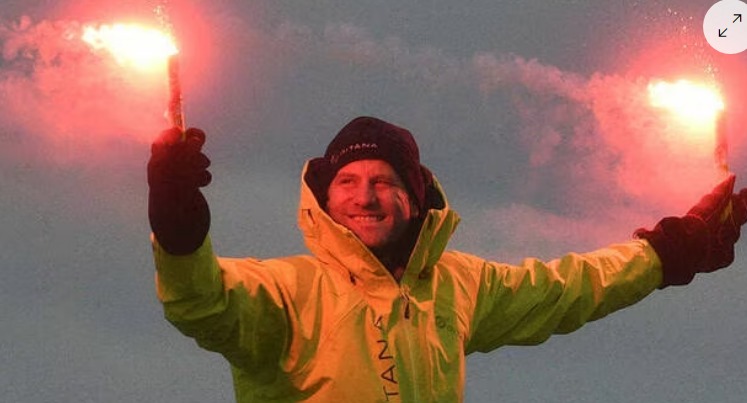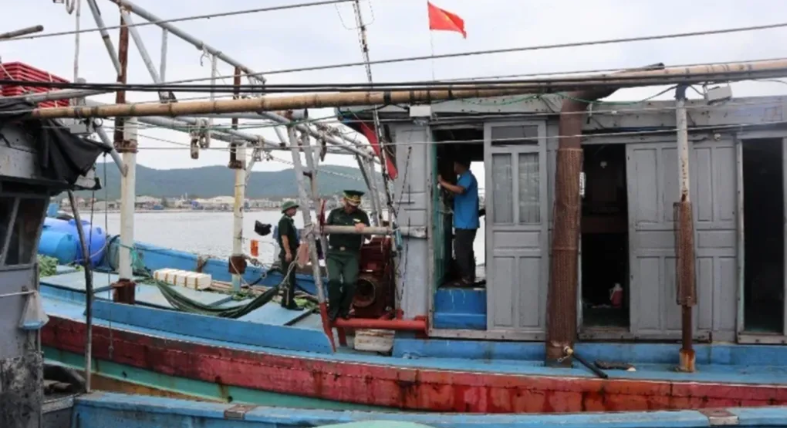Winning the ARKÉA ULTIM CHALLENGE-Brest – the first ever solo race around the world on giant 32m ULTIM multihulls – after 50 days 19hrs and 7 minutes and 42 seconds, French skipper Charles Caudrelier today secured the most prestigious victory of a 20 year racing career which has already seen him as victorious skipper on the crewed multi-stage The Ocean Race round the world, as well as three double handed wins on the Transat Jacques Vabre and solo on the Route du Rhum transatlantic.
Having just turned 50 years of age on Monday, whilst he was completing the final 400 miles of the 22,460 nautical miles course, Caudrelier’s outstanding triumph sees him join the great names among the pantheon of French ocean racing.
His win rewards his remarkable work ethic, a strong appetite for self-sacrifice, perseverance and a powerful sense of community, family and teamwork which also underpinned his successful leadership of the winning Chinese backed Dongfeng team on The Ocean Race. His solo triumph today is a just reward for the immaculately run historic Gitana team’s multihull project which started almost ten years ago.
And so the Paris born, former Merchant Marine officer Caudrelier, at 50 years and one day old, has become the Ultimate ‘Ultim’ sailor, the one who sailed best on the best prepared, most optimised and reliable giant ULTIM, to win this inaugural, first ever round the world race in a multihull and solo.
Caudrelier is a sailor who has always enjoyed sailing alone and who dreamed of emulating the solo success of the heroes of his youth, names such as Michel Desjoyeaux and Jean Le Cam. He remains discrete and humble and, whilst he deals with the rigours and deprivations of the Southern Oceans and cherishes his bond with the ocean and nature, that is balanced by his real appreciation for his close family circle, his friends and teammates.
Indeed before the Sunday January 7th start he made a promise to his children to be back in time for a mid-term holiday, a surf trip with his young son Maxime and his daughter Nina – who may have been less keen on the choice of activity – but Caudrelier left Brest sure she would be convinced.
There is a constant, down-to-earth duality to Caudrelier. On the one hand his imposing build and fitness gives an impression of solid dependability, he works hard in the face adversity, accepts being hurt, fights against the odds, but also gets visibly annoyed and complains when things don’t go well.
On the other hand there is his openness, a gentleness in his eyes, in his carefully chosen words, in his attention and support for others. At the same time Caudrelier is a fierce competitor but a sincere personality. He is content solo but is a happy, family man.
He is adept at comparmentalizing the constant stress and intensity of, noisy high speed ULTIM racing for extended periods, but is exhilarated by the calm while cruising. And for all that, he recently acknowledged that he was “not necessarily made to be a sailor”: “I get seasick, I don’t like it when things move and in fact most of all I like dead calm”.
Like many others before him, Caudrelier owes the genesis of his sailing career to his parents, “My mother, a Parisian for whom Brittany represented the end of the world agreed to follow my father who hated the city and dreamed most of all of boats and horses,” he told Paris Match in 2009. And so his childhood was spent on the bay of Port-La-Forêt, where the all the great sailors of the time trained.
The young Caudrelier loved the beach and the ocean and went windsurfing as much as he could thanks to his dad’s extensive quiver of boards and fishing. And it was on his father’s cruising boat that he made his first longer sailing passages. Indeed, in his early youth, he asked only to spend the night sleeping on the boat alone. Unbeknown to his parents he then went for his first solo night sail just to see what the experience was like, returning back to the mooring before anyone had noticed, reporting back that he had slept perfectly through the night.
At the request of his father, who had seem too many pro sailors of the time run into hard times financially, further education studies came before being allowed to sail full time. Accordingly he took his Merchant Marine officer qualifications, at the same time taking on his first races, immediately demonstrating his talent. Among his friends and rivals of the time are Franck Cammas, Armel Le Cléac’h and Sébastien Josse.
Caudrelier impresses, and 20 years ago wins the Solitaire du Figaro at the age of 30. Then he adds three Transat Jacques Vabre wins, two Volvo Ocean Races – “an extraordinary human adventure” and a Route du Rhum victory two years ago which really established his name as a solo racer in the eyes of the general public. He noted today that his major successes have arrived at ten year intervals.
He believed in his lucky star
This win is also testament to the continued assiduous development and optimisation of the Verdier designed Maxi Edmond de Rothschild which has been ongoing since its launch in 2017. They have learned from three consecutive unsuccessful round the world challenges for the Jules-Verne Trophy in 2020 and 2021 as well as again last year when the Gitana team had to return after just one day.
Nothing, then, is ever taken for granted as Caudrelier and co-skipper Erwan Israel – one of his routing cell on this race – know too well. Their Transat Jacques Vabre last November becomes a test of Caudrelier’s skills in fixing their boat and keeping going after damage to the steering system soon after the start and damage to a foil compromised their chance of winning the two handed race from France to Martinique.
Just over seven weeks ago Caudrelier set off from Brest saying “I believe I have a lucky star”. The skipper of the Maxi Edmond de Rothschild was in the leading duo from the first hours of the race. The start itself looked like a sprint which just continues and continues, “It’s a round the world race, we’re not in ‘Route du Rhum’ mode,” he maintains after two days of racing.
Forty-eight hours later the first significant depression comes with up to 50kts of wind and there is the first major damage a wave causing a break in the starboard front fairing.
**The duel, the charge and the need for caution is established. **
But the pace does not drop as 26 year old rival Tom Laperche (SVR-Lazartigue) presses relentlessly hard. The intensity is at a maximum as the duo go head to head, as little as two miles apart at speeds of well over 30kts. On the 18th January speeds reach a peak and Caudrelier makes 828 miles in a 24 hour period, just less than the 851 miles Francois Gabart did in 2017 on Macif.
But just as the race is shaping up to be an extended duel, Laperche is the victim of a collision with an object which wrecks his main daggerboard and casing, causing a significant ingress of water. Laperche has to retire into Cape Town and Caudrelier’s lead is suddenly more than 1000 miles.
Across the Indian Ocean to Cape Leeuwin Caudrelier sets a new solo record, 1 day and 8 hours ahead of François Gabart’s 2017 mark), crossing the Indian Ocean in 8 days and 8 hours. The Pacific is less kind in terms of conditions but the French skipper confides that he does not pay attention to the records or data, “I am not fighting against the stopwatch, it would be stupid to press the boat too hard and break it in pursuit of a record, I take the pleasure in rolling out my route, optimizing my trajectory and choosing the right sails.”
Two days later he has to slow, putting his race ‘on hold’ for 48 hours as gusts of 50 to 70 knots are expected at Cape Horn and so he prefers to wait. And this is not the only concern. Icebergs are drifting near Cape Horm requiring increased vigilance.
Nonetheless his passage of the ‘Horn’ by day is majestic under a heavy, threatening sky. It is his first solo rounding and the first for the boat too. “This remains a legendary place and it’s magical.”
Above all, do not “sacrifice work out of impatience”
In fact, compared with the first third of his race during which he had the prefect ‘to order’ conditions – riding the same low pressure from Brasil’s Cabo Frio nearly to the Pacific – the final 7,000 miles back to Brest, climbing the South Atlantic felt like purgatory.
He has to stay inshore, upwind to avoid the South Atlantic high pressure, then facing a violent depression and always adapting to changing conditions. And as he remains the only skipper in the race not to have to make a technical stop for damage, he voices his nagging concern, “I live with a sword of Damocles hanging over me, my boat is not perfect. I only have one fear, and that is that it will stop.” He admits he finds himself “getting angry over nothing very much” recognising how much harder it is to manage this continuous tension.
And even the final runway into Brest proves problematic. A storm named Louis is approaching the Breton coast and the crossing of the Bay of Biscay looks treacherous.
“I’m not going to sacrifice the team’s work out of impatience.” He says and heads towards the Azores and the island of Faial. Stopping in the middle of a race starting again and winning is unusual in high-level sport. Michel Desjoyeaux of course did it, returning back to Les Sables d’Olonne after electrical damage after the start of the Vendée Globe (2008-2009), Loïck Peyron and Jean-Pierre Dick stopped in the Cook Strait before winning the Barcelona World Race (2010-2011). And motor sports fans will remember that Michael Schumacher already won the French GP in 2004 after four pit stops.
But having built a lead of the best part of 2000 miles Caudrelier could afford to stop in Horta for four days. He did some boat fixing, spent nights ashore in a proper bed had many showers and rested whilst he says always “having the impression of staying in the race”.
But the prudence pays off and Caudrelier and the Maxi Edmond de Rothschild complete the final 1200 miles at a steady, reduced pace. He eschews the chance to celebrate his 50th birthday and finish on the 50th day of the race to be doubly sure of coming in behind one last big depression rather than fall victim to the 40kts winds it held.
And so Caudrelier today completed the dream of his youth, winning a solo race around the world. That it was the first ever for a fully foiling, giant ULTIM 33m multihulls adds to his remarkable achievement, a job very well done as he summits the very top peak of ocean racing.
Source: arkeaultimchallengebrest




